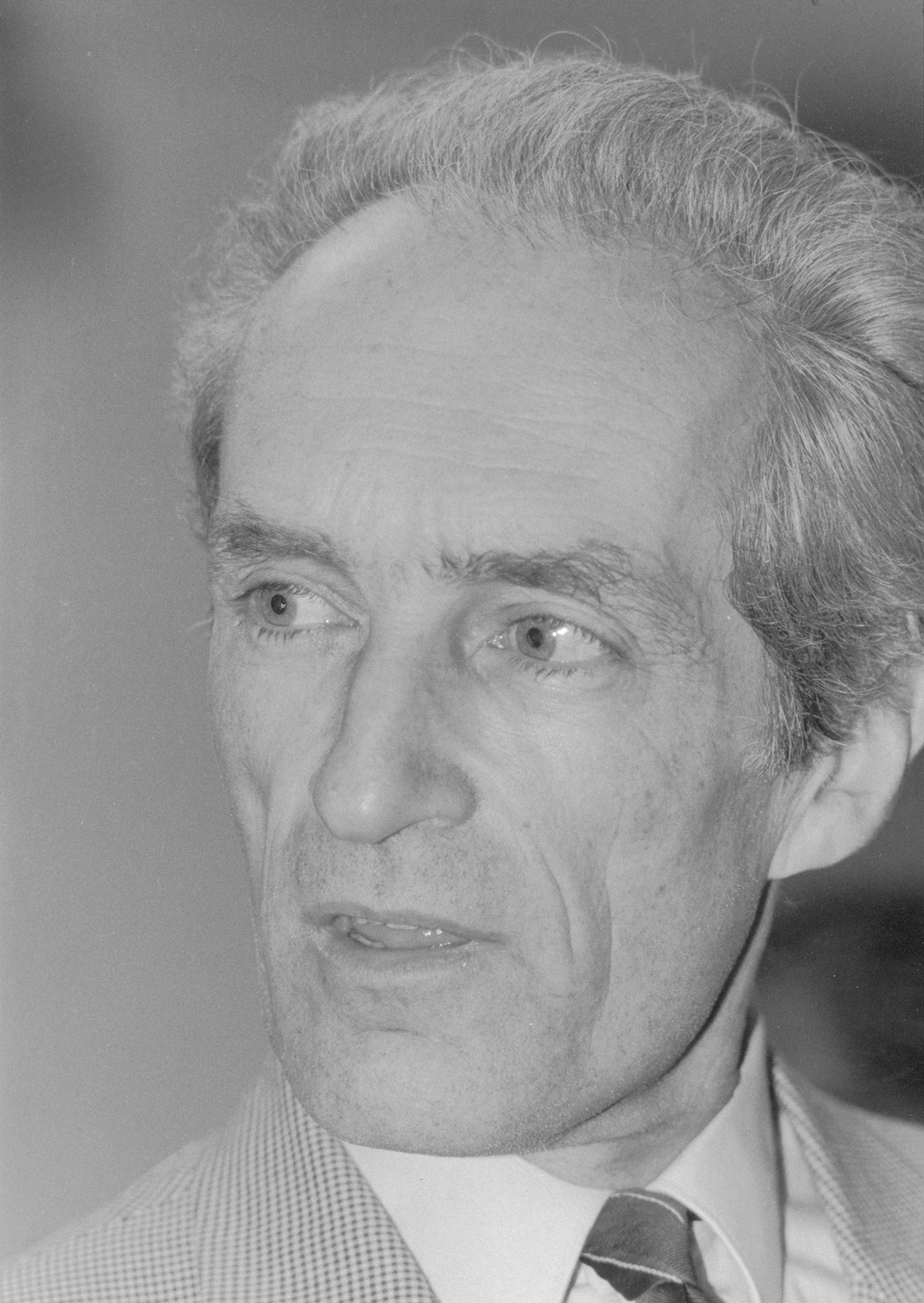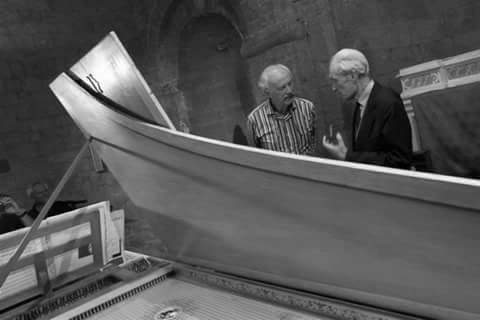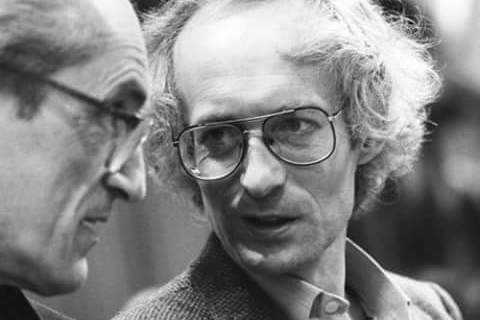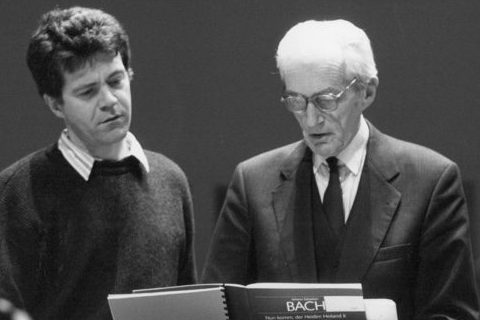GUSTAV LEONHARDT
There’s absolutely no doubting the enormous influence Leonhardt held over multiple generations of music making in the Baroque field . . . John Butt
Gustav Leonhardt was born in 's-Graveland, North Holland, in 1928, and studied organ and harpsichord from 1947 to 1950 with Eduard Müller at the Schola Cantorum Basiliensis. In 1950 he made his debut as a harpsichordist in Vienna, where he studied musicology. He was professor of harpsichord at Vienna’s Hochschule für Musik from 1952 to 1955 and at the Amsterdam Conservatory from 1954. He was also an organist at Amsterdam’s Waalse Kerk and later the Nieuwe Kerk, both of which have fine historic instruments. As soloist, chamber musician and conductor, Leonhardt made well over 100 recordings. He died in Amsterdam in 2012.

Herb Snitzer/ArenaPAL

Marco Borggreve/ArenaPAL
LEONHARDT ON TEACHING
“In any case, education can never create personalities. In that regard, a student is good or not and that has nothing to do with the teacher. Fortunately, I was always able to decide for myself who I did or did not allow into my studio. My students always had to decide for themselves what works they would present in lessons. Whoever had chosen Frescobaldi's third toccata had to be able to justify that choice and therefore had to have listened to all the other toccatas. I never played anything in advance. I listened to the students and tried to identify weaknesses or uncertainties. They had to be able to say for themselves why they had connected or detached certain notes. If they did not know the answer, I gave it. For those answers you can go on the basis of treatises or on manuscripts. In many situations, the instrument itself dictates how to play. The core of musical pedagogy is, from my point of view, that musicians have to learn to formulate an answer when asked the question, 'why?'”
Concertgebouwcahier, “Historische Uitvoeringspraktijk?” Elise Simoens in gesprek met twintig eminente stemmen uit de wereld van de oude muziek (Bruges, 2011), tr. Douglas Amrine.
“I listen to a student, I see what’s missing in the playing—it’s never the same thing—and we work on it. Or rather, it’s the student who works on it, one lets the student do it. I ask, 'Why do you play the bass like that?' The student either knows or doesn’t know, but must find out why. This type of reasoning can be taught—but not beauty.”
Le nouvel Observateur, interview with Jacques Drillon (November 15–21, 2007), tr. Davitt Moroney.

WORDS FROM LEONHARDT’S STUDENTS
“Leonardt often said that you should prepare your interpretation at your desk. But his own interpretations are so creative and his timings so lively that they seem more spontaneous than well thought out behind a Desk”.
Ton Koopman in BACH: Journal of the Riemenschneider Bach Institute 48-49, no. 2-1 (2018)
“For Leonhardt, as for other great players, performance was an act of criticism in the best sense of that word, a process by which he analyzed and (to take a metaphor) operated with surgical skill on a work, laying it open so that the audience could perceive the wonderful nature of its innards. This was no post-mortem. The piece emerged full of pulsating, inner life . . . No one who came into personal musical contact with Gustav Leonhardt remained untouched. For most people his teaching was intensely powerful. As memories of his sharply phrased comments returned, the effect went on working for decades after the lessons were finished and, in my case, still continues resonating thirty years later.”
Davitt Moroney in Newsletter of the Westfield Center 23, no.1a (2012)
“Leonhardt would be the first to admit that faithfulness to a composer, his style or his score is irrelevant without confidence in one’s own individual interpretation . . . He built this inner confidence in a variety of subtle means—en cachant l’art par l’art—with the wisdom necessary to recognize that, even with a confident musical personality, one must always continue to build in order to play better.”
Skip Sempé, Gustav Leonhardt and The Little Red Harpsichord (1995)
“He taught by example, showing his solutions and revealing what he called ‘professional secrets’. What became clear to me over the next few months was that he was sharing with me, always in great detail, his understanding of the language and style of a piece, as well as techniques for bringing these out in performance, and above all, techniques which made the harpsichord expressive. Yet, he was not dogmatic, and encouraged me to bring my own ideas and imagination to the lessons.”
Charlotte Mattax Moersch, “Recollections of My Lessons with Gustav Leonhardt” read more
“As for ‘abandon’, this may not be a quality that most people associate with Leonhardt, a famously patrician, reserved, and austere man. But his striking manner of over-holding sixteenth notes to create an impressionistic wash of sound and the impeccable sense of timing, freedom, and rubato that he dared bring to baroque music—these are acts of abandon. One of the things he most emphasized to me was his belief that the great performers of the seventeenth and eighteenth centuries did not hesitate to break the ‘rules’ of style when the occasion was right.”
Jeannette Sorrell, “Imagination on Fire: A Remembrance of Gustav Leonhardt,” in BACH: Journal of the Riemenschneider Bach Institute 48, no. 2 and 49, no. 1 (2018)
“One of the last things I heard him play was an unmeasured prelude, and I remember feeling that EVERY NOTE was placed with exactly the most appropriate split-second timing. I feel that timing, in the sense of when exactly you play a note and when you release it, in a context of rhythmic nuance, is more important on the harpsichord than on any other instrument, and that Leonhardt is the person who first made us all aware of this fact, and who was able, better than anyone I have ever heard, to demonstrate it.”
Alan Curtis, “Remembering Gustav Leonhardt,” in Appreciating Gustav Leonhardt (Berkeley: Western Keyboard Association and MusicSources, 2012)
“His ear for detail was extraordinary. I remember in particular a lesson where we worked on the Allemande from Bach’s 6th Partita. Again and again, he asked me to repeat a group of four demisemiquavers, where the first one is a tied note. The first - silent - note should be strongest, the second a bit less, the third more, but less than the first, and the fourth least of all. All absolutely part of a strong/weak beat approach to playing, on the most minute scale. Of course I couldn’t do it there and then, but it is a way of understanding a whole pre-19th century repertoire which has informed my own playing ever since, and one that I try to share with students. I have sadly very few of his markings in my scores — very faint decrescendos which turned a straight line into a flexible, dynamic one. I treasure those elegant little signs that seem a badge of having been a witness to a very great musician at work.”
Carole Cerasi
“I feel particularly grateful to Leonhardt for helping me to deepen my understanding of French baroque composers, and to approach their works with the most appropriate artistic style and pronunciation.That approach was valid, too, for the French side of the Germans like Bach, Böhm and Froberger. His teaching emphasized the use of subtle dynamic effects, and a way of playing sans contours that finds its visual counterpart in the paintings of Watteau.”
Francesco Cera
“Gustav Leonhardt’s musicianship has been a continuous source of inspiration for me. When I finally was in the position to take lessons at his house in Amsterdam, he spent considerable time and effort to critically assess my playing (quite in contrast to his generally complimentary style at masterclasses), from which I benefit every day even today, and for which I am eternally grateful. The impact of this shift in the world of historical performance practice will be great. No matter whether in accordance or in opposition, there will be few harpsichordists today whose playing is not, in one way or another, influenced by Leonhardt’s approach.”
Tilman Skowroneck, https://skowroneck.wordpress.com/ (January 2012)

with Alan Curtis

with Bob van Asperen

with Siebe Henstra